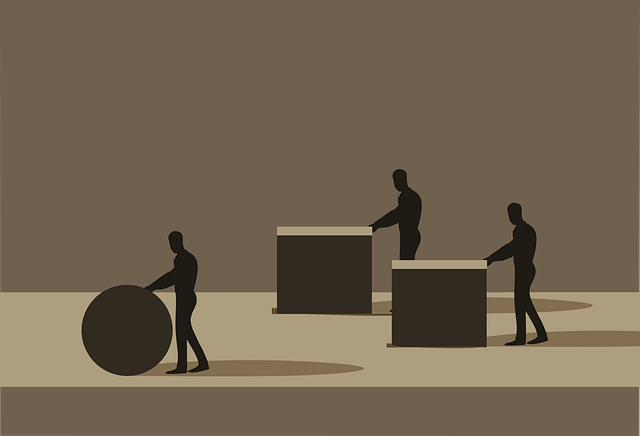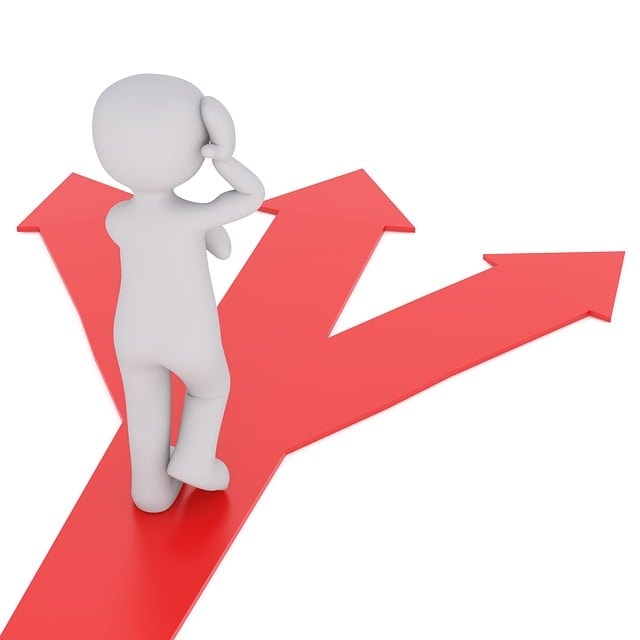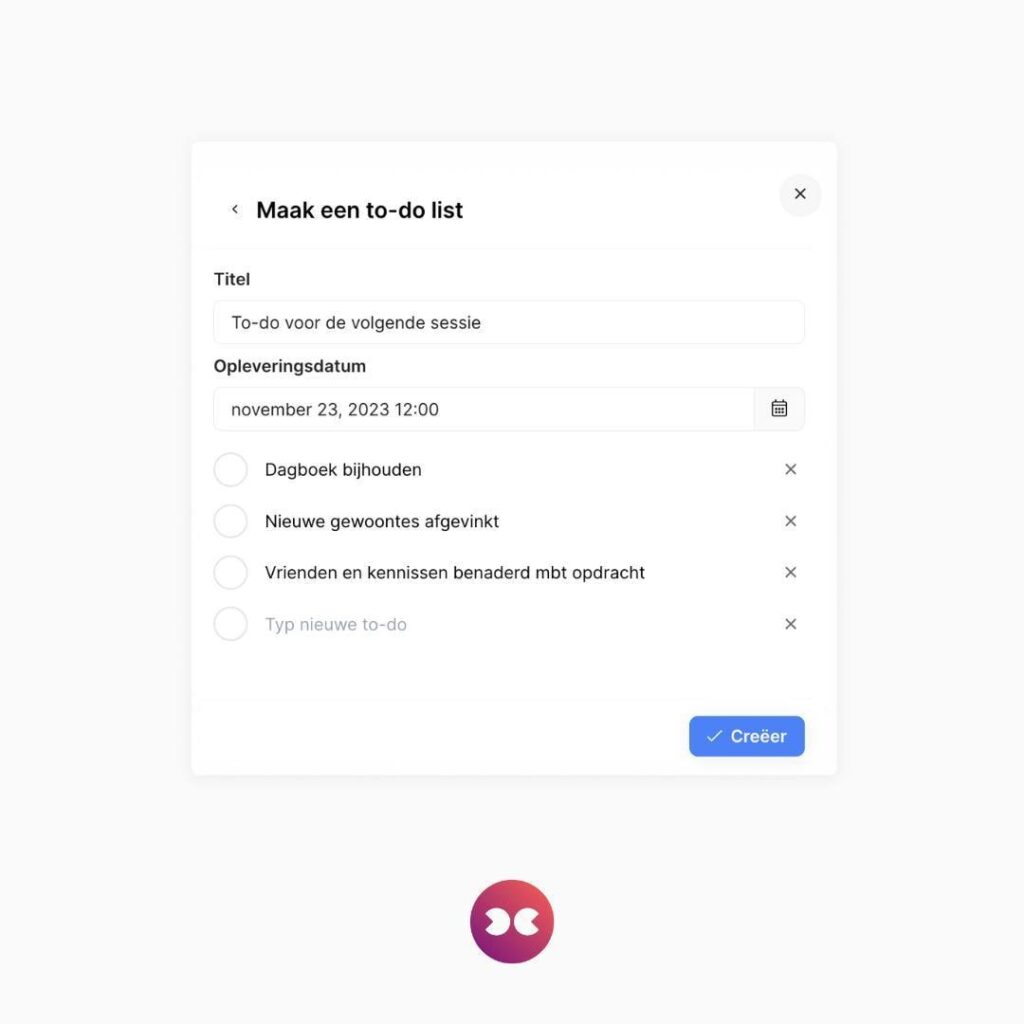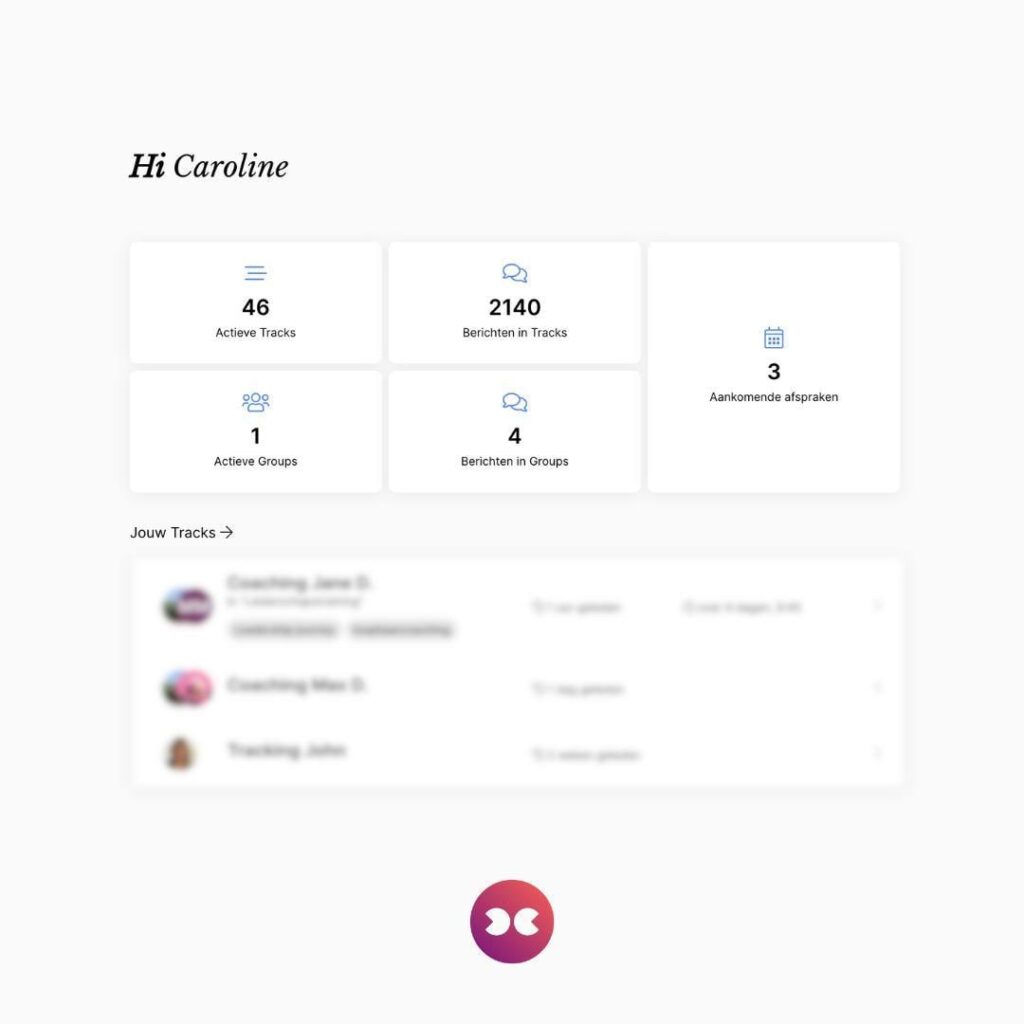Working More Effectively: Tips and Tools for Coaches
As a coach, you naturally want to provide your coachees with optimal support. In order to help as many people as possible, you will have to work effectively and efficiently and make optimal use of your time. But how do you ensure that you complete your tasks effectively without becoming distracted or overwhelmed? In this article we discuss various strategies, techniques and tools that help you increase your productivity and better organize your working day.
Work more effectively or work efficiently?
Effective and efficient are two words that are often used interchangeably, but are indeed different. Working effectively is about performing the tasks that bring you closer to your goals. You perform the right tasks in a way that achieves the desired results. Working efficiently means that you complete the tasks with minimal waste of time and energy. It's about working smart.

To be productive, you ultimately want a combination. It's about using your time and energy wisely (efficiently) to achieve your desired results and goals (effectively). But how do you do that, work smarter? You will have to make more conscious choices about what you spend your time on and how you approach tasks. By working effectively and efficiently, you can achieve more in less time and ensure less stress, more rest and a better work-life balance. That makes working effectively important.
Ready for a free checklist that you can use to work more effectively?
1. Set clear goals
Setting clear goals is the first step towards working more effectively. Use SMART goals (Specific, Measurable, Achievable, Realistic, Time-bound) to ensure you know exactly what goals you want to achieve. This prevents you from wasting time on tasks that do not contribute to your desired results.

2. Setting priorities
Setting priorities is crucial for time management. Focus on the tasks that add the most value and make sure you tackle them first. Set priorities using the Eisenhower matrix, which distinguishes between important tasks and urgent tasks. This provides insight into what you should focus on and which tasks are really necessary. You can also see whether certain tasks can be better delegated or even removed from the to-do list. This way you focus on what is really important and prevent you from spending too much time on less important matters.

3. Work on one task at a time
Multitasking can lead to errors and reduced productivity. Combining tasks may sound efficient, but switching from one task to another can reduce your focus and cause you to lose sight of important tasks. Concentrate on one task at a time to increase your effectiveness and not lose track.
A popular technique is the Pomodoro technique, where you work concentrated for 25 minutes and then take a 5-minute break. For longer periods of concentrated work, you can use blocks of 90 minutes, followed by a 15-30 minute break. This helps you maintain your focus, manage your energy better, and avoid distractions.
4. Manage your time and schedule
Good weekly and daily planning is essential for effective work. At the beginning of the week, make sure you know what tasks you have to do and when you plan to do them. Set clear priorities.
It is advisable to take a moment every evening or at the end of your working day to review the plan for the next day. This way you won't be faced with any surprises and you can work smarter. You can use Trackler's various tools to keep track of your calendar, notes and to-do list. This will help you manage your time more efficiently and ensure you don't run out of time.

5. Reduce distractions
Distractions are one of the biggest enemies of effective work. Ensure a quiet workplace, a tidy desk and minimize distractions by turning off notifications and making clear agreements with colleagues. You can use noise-canceling headphones or soothing music to help you concentrate.
Let the place where you work be the place where you do just that: work. You eat, relax and do other activities in a different room. The point is that your body makes the association with effective and efficient work as soon as you sit behind your desk. This allows you to eliminate distractions and significantly improve your effectiveness and efficiency.
6. Take regular breaks and exercise
Regular breaks are crucial to maintain your energy and focus. In any case, plan a short break of 5 to 10 minutes every 90 minutes during which you can stand up, loosen your arms or move around a bit. Take a 30-60 minute break around lunchtime to take a walk and get some fresh air. This helps you avoid fatigue and increase your focus and productivity. Short breaks and exercise give you the opportunity to step away from your work and focus on other matters, so that you can return with renewed energy and work effectively again.

7. Take advantage of your peak moments
Your peak times are the times of day when you are most alert, energetic and productive. By tracking how your energy and concentration levels fluctuate for a week, you can discover when your peak times are and when you work most effectively. For most people, these moments fall in the morning or around noon. Once you've identified your peak times, reserve these times for the most important and challenging tasks. This increases the chance of successful and efficient completion of these tasks.
8. Take care of yourself
It is important to find a good balance between work and relaxation to prevent burnout. Sufficient sleep, a healthy diet, regular exercise and time outdoors are really important to work effectively and efficiently. Try a hobby or sport for real satisfaction instead of using Netflix or your phone as a distraction. Take time to relax, clear your mind and let your creativity flow. This way you prevent burnout and you can work effectively and efficiently again with a fresh look and new focus.
9. Use checklists
Checklists are a simple yet effective way to organize your tasks and ensure you don't forget anything and work efficiently. Use tools such as Trackler in which you work with digital checklists to keep track of your daily tasks and goals. This helps you maintain an overview and focus on the right things. It ensures that you can focus on completing your daily tasks without missing important details.

10. Set realistic expectations
It's important to set realistic expectations for what you can achieve in a day. Overplanning can lead to stress and disappointment. By being realistic about what you can do and organizing your day accordingly, you can increase your effectiveness and reduce stress.
11. Communicate effectively with coachees
Good communication with your coachees is essential for a successful coaching relationship. Make sure you make clear agreements and record them in Trackler. This helps to avoid misunderstandings and ensures that both you and your coachee are continuously informed of progress and next steps.
12. Reflect on your work
Take time regularly to reflect on your work and your progress. What works well? What can be done better? By evaluating regularly, you can adapt and continuously improve your working methods. You can do a short evaluation daily or weekly. An extensive evaluation can be done monthly, quarterly and annually.

13. Automate where possible
Automation can help you save time and make your work more efficient. Trackler lets you work smarter and brings everything you need into one tool. This allows you to automate routine tasks such as scheduling appointments, tracking progress, managing customer data and administration tasks. In short: more overview, fewer errors and fewer tasks for you. This gives you more time to focus on important matters.
14. Organization
Make sure you know where everything is so that you maintain an overview. You're probably familiar with it: some notes on paper, some on your laptop, some in a file on your Drive. You send your coachee an email with all the information, but you receive the responses on WhatsApp and the appointments via the website suddenly do not sync with your agenda. Not really efficient.
Ideally, you have everything in one place. There are various tools you can use for this. Trackler distinguishes itself in this way: it is a one-stop-shop for you and your coachees. It offers an extensive set of digital coaching tools that support you in communicating with coachees, tracking your coachees' progress and managing your agenda and notes.

15. Continue to develop
Improving your effectiveness and efficiency is a continuous process. Continue to learn and develop by following training courses, reading books and attending workshops. Trackler offers numerous opportunities to improve your skills and optimize your coaching practice.
Finally, sharing knowledge and experiences with fellow coaches via the community platform Connectler can help you discover new insights and techniques. By working together and exchanging smart tips, you can learn from others and further develop your own skills.
Conclusion: work effectively or work efficiently?
Working effectively is about doing the right things that bring you closer to your goals. Working efficiently is about doing the right tasks well, so that you complete them quickly and with minimal waste. The ideal scenario is to combine effective and efficient work: work on the right tasks (effective) and perform them in the most efficient way (efficient).

What works effectively as a coach
As a coach, working more effectively means making optimal use of your time and energy to help your coachees. By setting clear goals and priorities, minimizing distractions, and working on the task at hand, you'll work toward your goal.
What works efficiently as a coach
By using the right tools, automations, organization and the right communication, you can increase your productivity, achieve better results and work more efficiently overall. Trackler offers you the support you need to make your work more efficient and take your coaching to the next level. By having everything in one place, you can keep an overview and easily apply all these tips.
Ultimately, you not only want to improve your own productivity, but also maximize the impact of your coaching. Try out the tips and tools from this article and let us know if your effectiveness and efficiency have improved!